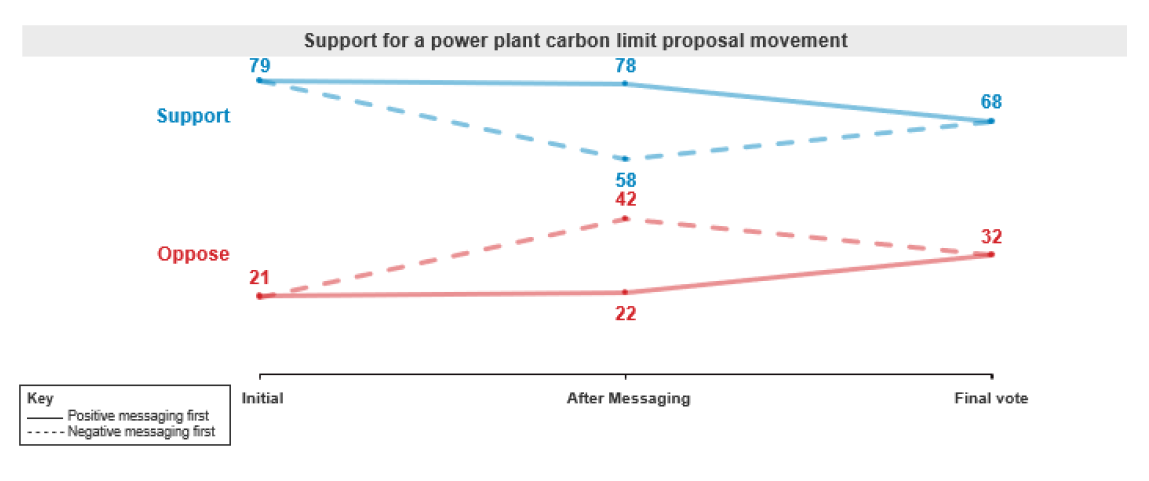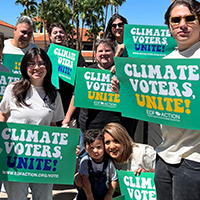79 percent of Pennsylvanians agree: It is time to limit carbon pollution
By Mandy Warner, Senior Manager of Climate and Air Policy
Pennsylvania is a unique place with diverse regions, landscapes, economies, and people, so when a policy emerges that garners 79% support, policymakers should take notice. A new survey conducted March 19-26 by Global Strategy Group among 1,201 likely 2020 voters in Pennsylvania found strong support for a proposal to zero out carbon pollution from power plants – a substantial 79% overall. This support was bipartisan, with 66% of all Republicans (90% of moderate Republicans), 91% of Democrats, and 82% of Independents supporting regulations to limit carbon pollution from power plants in Pennsylvania. This also holds true across city, suburban, and rural populations.

As pollster Andrew Baumann notes: “Nearly eight in ten Pennsylvanians polled support a proposal to “create regulations to place a limit on carbon emissions from Pennsylvania power plants that would decline over time, reaching zero emissions by 2040.” (79% support/21% oppose). Pennsylvania is one of the top three dirtiest states in the country for carbon pollution—the power sector is the single largest source of Pennsylvania’s carbon pollution and the fifth dirtiest power sector in the nation.
The survey also found that legislative proposals to bail out the nuclear industry were deeply unpopular, with 64% opposing those proposals (including 70% of Republicans, 69% of small town/rural Pennsylvanians, and 64% of suburban Pennsylvanians opposing the bailout). And when having to pick between proposals, the carbon limits trounce the nuclear bailout with 71% in support of the carbon limits policy – with Republicans supporting carbon limits versus a nuclear bailout by an 8-point margin. And even after being exposed to a simulated, rigorous debate, strong support is maintained for the carbon limits policy (and even is maintained at 58% when only attacks on the policy have been presented) and majority opposition to the nuclear bailout remains.
 When asked about support for lawmakers relative to their position on strong action to take on the climate crisis, Pennsylvanians overall prefer lawmakers who support strong action to combat climate change, and both Democrats and Republicans earn a net positive benefit when supporting a carbon limits proposal for power plants.
When asked about support for lawmakers relative to their position on strong action to take on the climate crisis, Pennsylvanians overall prefer lawmakers who support strong action to combat climate change, and both Democrats and Republicans earn a net positive benefit when supporting a carbon limits proposal for power plants.
Furthermore, candidates that make support for carbon limits a 2020 campaign focus see their electoral chances improve, while candidates who oppose the policy saw a decrease in support. In fact, after a rigorous debate, a generic Democrat who supports a proposal to put regulations in place to limit carbon emissions receives a 10-point boost over a Republican who opposes such an effort, if carbon regulations became a centerpiece of the campaign. (Though worth noting again that support for action is bipartisan, with Republicans favoring regulations to limit carbon emissions and Independents viewing opponents of climate action very negatively.)
At a recent event announcing that Pennsylvania will join the U.S. Climate Alliance and where the state’s Climate Action Plan was released, Governor Wolf stated that power sector carbon limits, such as the existing Regional Greenhouse Gas Initiative (RGGI), warrant a “serious look.” RGGI is a market-based system that reduces carbon pollution from power plants in nine northeast and mid-Atlantic states. RGGI has been in effect for a decade and has provided substantial benefits to states including reduced carbon and health-harming pollution from power plants, clean energy and efficiency jobs, and increased deployment of tools including energy efficiency, which has provided electric bill savings. States that are currently planning to further reduce pollution by 30% from 2020 to 2030 can also expect to have even lower average electric bills — with residential customers expected to pay 35% less every month in 2031 than they do now, according to a recent report by Analysis Group.
Strong, increasingly bipartisan support for action on the climate crisis is not new, but this survey is squarely in line with an accelerating national trend: Voters are demanding leadership from policymakers on the climate crisis, and straightforward solutions such as developing regulations to actually limit climate pollution from major sources of pollution is supported strongly by diverse constituencies across Pennsylvania.
In a 2018 report examining the challenging conditions for the Commonwealth’s nuclear fleet, the bicameral, bipartisan Nuclear Energy Caucus recognized that a carbon market/price is the “long-term” solution and that carbon markets have “broad and bipartisan recognition as the most efficient, effective, and market-based environmental policy solution.” Governor Wolf and legislators have a powerful opportunity to deliver on behalf of Pennsylvanians who overwhelmingly support setting a limit on carbon pollution from the power sector. Such a policy will help ensure that Pennsylvania is not left behind as states across the region implement prudent, cost-effective strategies to cut pollution while also driving investment in clean energy (and 66% of Pennsylvanians agree Governor Wolf must take action to ensure Pennsylvania is not left behind). Such approaches can also grow jobs while providing consumer cost savings—no wonder it’s such a popular idea.



